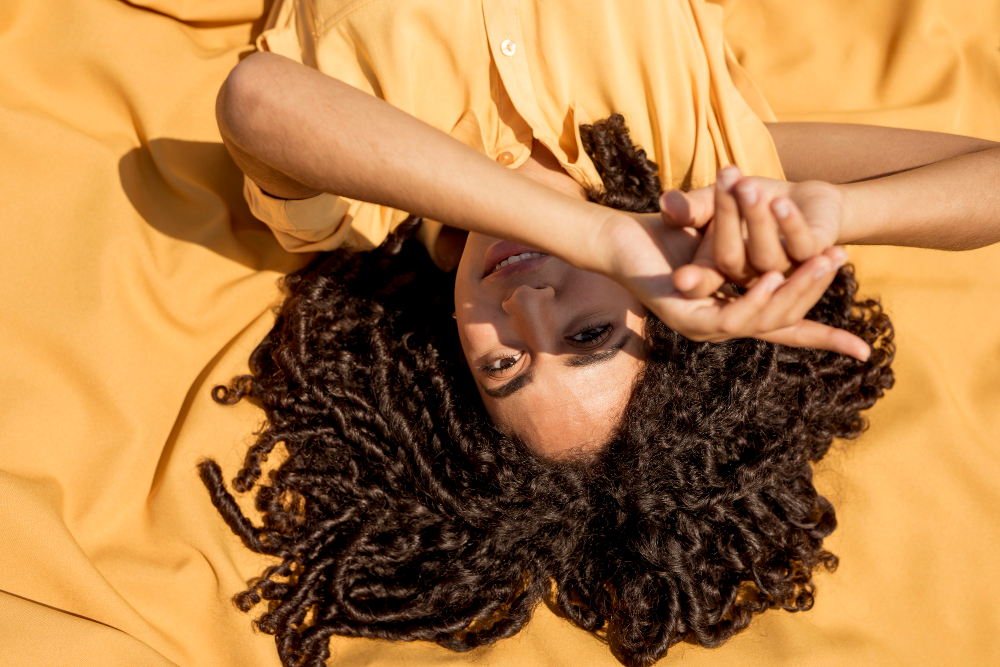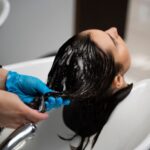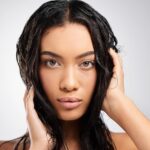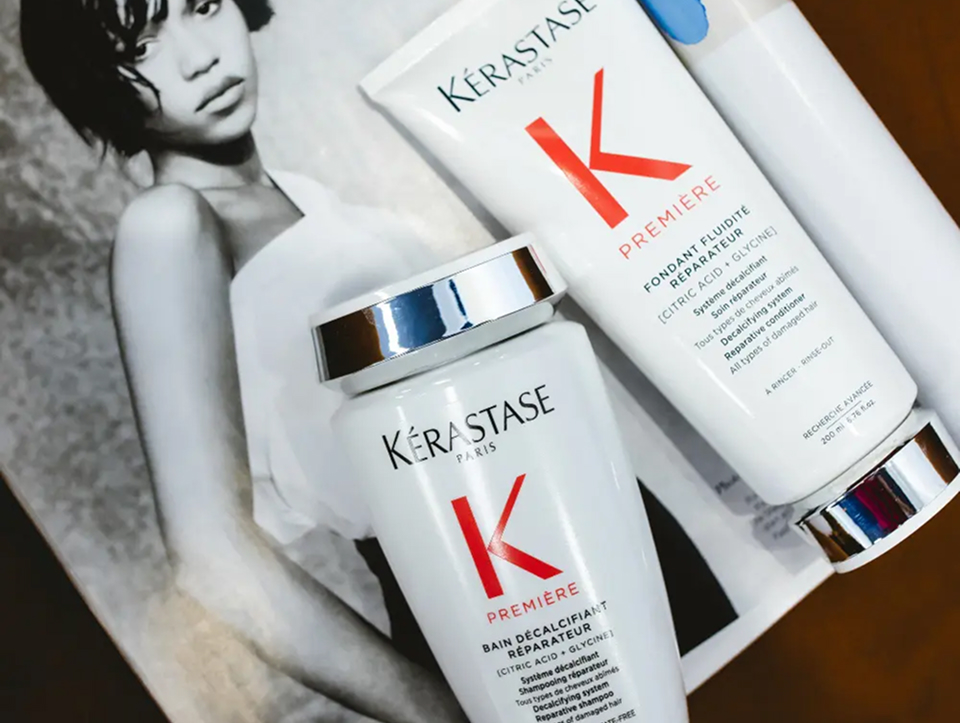What Is Virgin Hair? Virgin hair is 100% human hair that has never been chemically processed. That means no dyes, bleaches, perms, or relaxers—just natural, untouched hair with the cuticles intact.
Why does that matter to you? Virgin hair is the gold standard in the wig and extension industry. It looks more natural, lasts longer, and gives you styling freedom that synthetic or processed hair can’t match.
Why Virgin Hair Matters (and Why You Should Care)
If you’re shopping for extensions or wigs, quality is everything. Choosing virgin hair means:
- Durability – With proper care, virgin hair can last over a year.
- Styling freedom – You can curl, straighten, bleach, or color virgin hair just like your natural strands.
- Natural appearance – The intact cuticle gives a shine and flow that synthetic hair can’t mimic.
- Less tangling – Aligned cuticles mean less shedding and knotting.
👉 On the other hand, virgin hair isn’t for everyone. If you’re looking for a temporary style, a specific shade out of the box, or you’re on a budget, you may prefer alternatives.
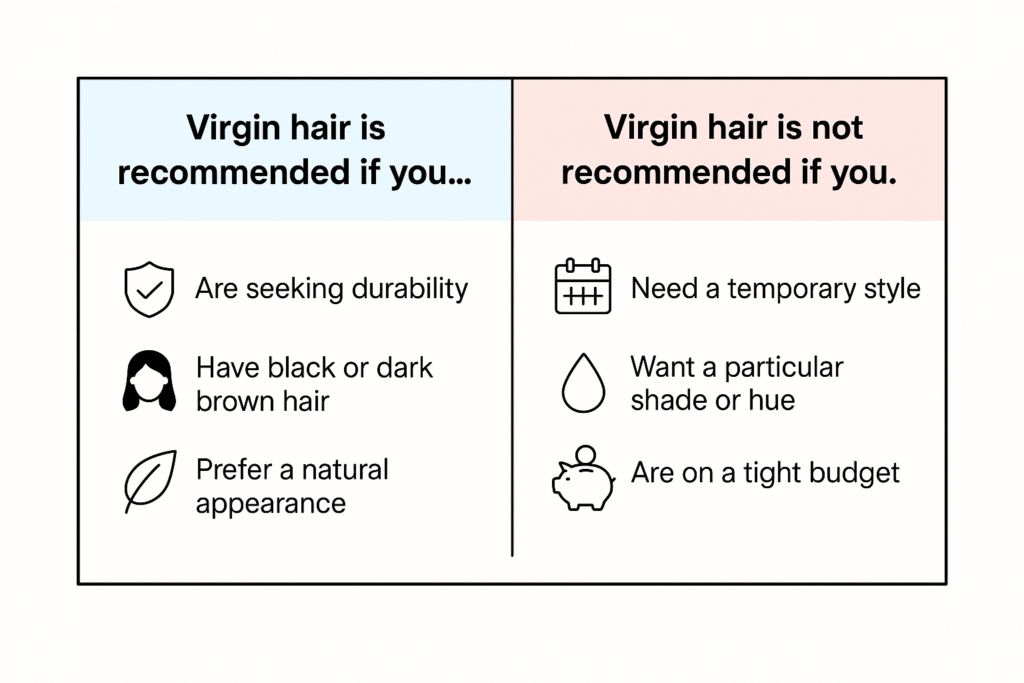
The Truth About Virgin Hair Labels
Here’s the problem: many sellers mislabel hair as “virgin” when it isn’t. Beware of hair bundles advertised as ‘virgin’ without proof of source or authenticity; to protect yourself, ask for burn-tests, cuticle alignment, or vendor transparency.”
To make sure you’re getting the real deal, always check:
- Uniform color with natural variation (not overly shiny or coated).
- No chemical smell (silicone or acid baths are a red flag).
- Cuticle alignment (strands should feel smooth from root to tip).
- Reputation of the brand – choose salons or suppliers you trust.
Virgin Hair vs. Human Hair vs. Remy Hair

It’s easy to confuse these terms, but here’s a quick breakdown:
| Term | What It Means | Key Difference |
|---|---|---|
| Virgin Hair | Human hair is never dyed, bleached, or chemically treated | Purest, untouched form |
| Remy Hair | Human hair with cuticles intact may be dyed or processed | High quality, but not 100% untouched |
| Human Hair | Any hair from a donor can be processed heavily | Quality varies |
👉 Read more about the differences in our guide: Reasons to Get Permanent Hair Extensions.
Types of Virgin Hair (By Origin & Texture)

When shopping, you’ll see virgin hair labeled by country of origin. Here’s what each type offers:
- Brazilian Virgin Hair – Thick, holds curls well.
- Peruvian Virgin Hair – Lightweight with natural volume.
- Malaysian Virgin Hair – Silky, smooth, and shiny.
- Indian Virgin Hair – Versatile, wavy, easy to blend.
How to Tell If Your Hair Is Still Virgin
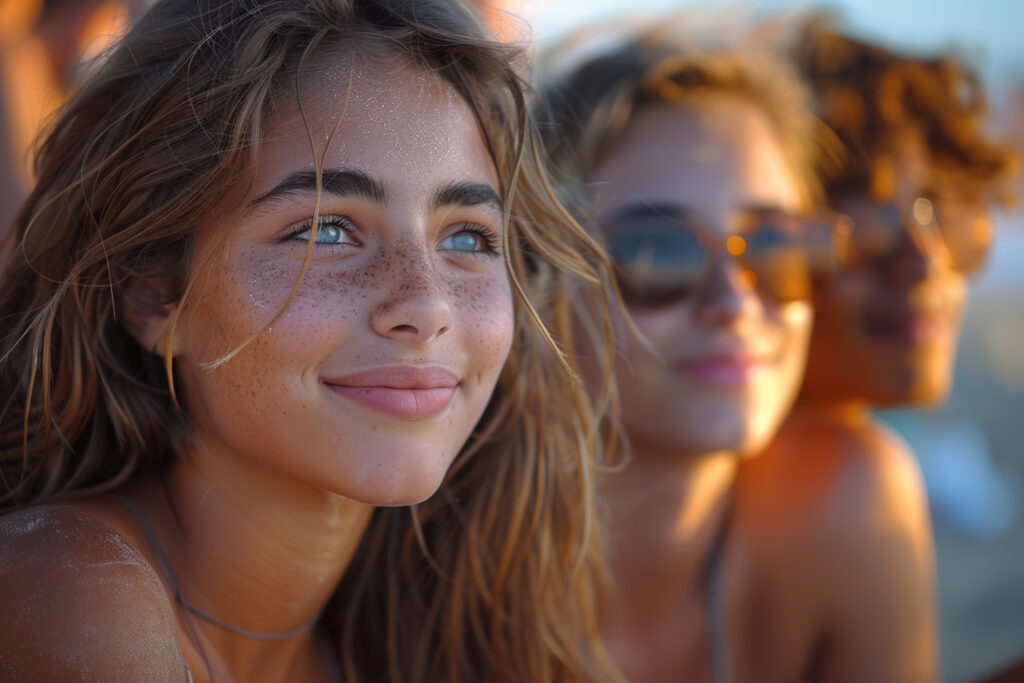
You might wonder if your natural hair still qualifies as “virgin.” Virgin hair means it has never been chemically altered — no dyes, relaxers, perms, bleaching, or texturizing treatments.
But since even heat styling and environmental factors can affect your strands, here are practical ways to check:
- Look for color uniformity – Virgin hair typically has subtle, natural highlights and undertones. If your hair appears to be a single flat shade (jet black, brassy, or unnaturally red), it may have been dyed.
- Test with water – When you wet virgin hair, it should absorb and retain water easily. Over-processed hair can sometimes repel water due to silicone coatings or chemical treatments.
- Examine the ends – Virgin hair usually has healthier, less frayed ends than processed hair. Split ends or thinning may suggest prior treatments.
- Burn test (for extensions) – Some stylists use a tiny burn test (safely, with just a few strands). Virgin human hair smells like burning protein (similar to feathers). Synthetic or coated hair smells like plastic and melts.
- Scalp consistency – If you’ve dyed or relaxed your hair, your roots will grow out in a different texture or color than the treated lengths. Virgin hair will appear consistent from the scalp to the ends.
👉 Bottom line: if you’ve never colored, chemically treated, or altered your hair, you likely have virgin hair. But for extensions, always verify with a trusted supplier.
How to Care for Virgin Hair Extensions

Virgin hair extensions are a significant investment, and with proper care, they can last over a year (and sometimes even longer). Unlike synthetic hair, they behave like your natural hair — which means they need gentle, consistent care. Here are expert tips:
- Wash with sulfate-free shampoo – Harsh cleansers strip the hair of its natural oils, leaving it dry and brittle. Stick to mild, sulfate-free shampoos and follow with a hydrating conditioner.
- Moisturize regularly – Use a lightweight leave-in conditioner or natural oils (like argan or jojoba) to keep the hair soft and prevent tangling.
- Protect while sleeping – Wrap your extensions in a silk or satin scarf/bonnet, or sleep on a satin pillowcase to reduce friction and breakage.
- Detangle gently – Use a wide-tooth comb or detangling brush, starting from the ends and working your way up. Never yank through knots.
- Mind your scalp health – Healthy extensions start with a healthy scalp. Check out our Ultimate Guide to Scalp Care Under Extensions for pro tips.
- Limit heat styling – Virgin hair holds styles well, so keep heat tools on low settings. Always use a heat protectant spray.
- If coloring – Virgin hair can be dyed or bleached, but it’s always best to have it done by a professional.
👉 Treat your extensions like your natural hair (or better 😅), and they’ll stay silky, shiny, and tangle-free much longer.
Can You Bleach or Dye Virgin Hair?
Yes. Because it’s never been processed, virgin hair accepts color beautifully. Just remember: bleaching is harsh, so follow our guide to bleaching virgin hair or have it done professionally.
Quick Buying Tips Before You Invest
- Expect to pay more—virgin hair is a premium product.
- Buy from trusted salons or suppliers only.
- Read reviews, ask about sourcing, and check for transparency.
- If sustainability matters to you, ask about donor sourcing practices.
Invest in the Best for Your Hair
Virgin hair gives you the most natural look, unmatched styling freedom, and long-lasting results. Ready to elevate your hair game? Our experts at Haste Urban Hair Spa are here to match you with the perfect virgin hair extensions or wigs.
👉 Book your appointment today and experience premium quality virgin hair for yourself.
FAQ
What is considered virgin hair?
Virgin hair is hair that has never been dyed, bleached, relaxed, or chemically processed in any way. It maintains its natural texture, color, and integrity from root to tip, ensuring superior quality and longevity.
How to tell if hair is virgin?
Authentic virgin hair won’t have a chemical smell, will feel smooth and silky from root to tip, and will not show any signs of artificial dye. It also tends to have a natural shine and uniformity that processed hair often lacks.
What’s the difference between virgin hair and human hair?
All virgin hair is human, but not all human hair is virgin. Human hair can be processed, dyed, or chemically treated, whereas virgin hair is completely untouched and natural.
What is virgin black hair?
Virgin black hair refers to naturally black hair that has never been dyed or chemically treated. It retains its original color and natural health, making it ideal for styling versatility.
Is new growth considered virgin hair?
Yes, all hair growing from your scalp is considered virgin until it is chemically treated. This makes new growth the healthiest, most natural hair you can have.

